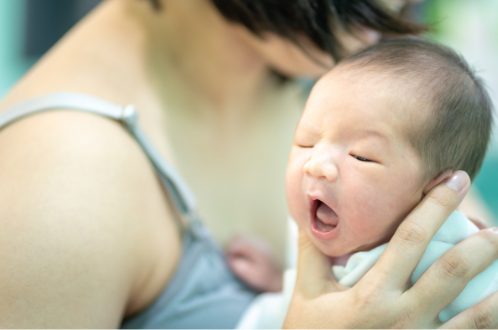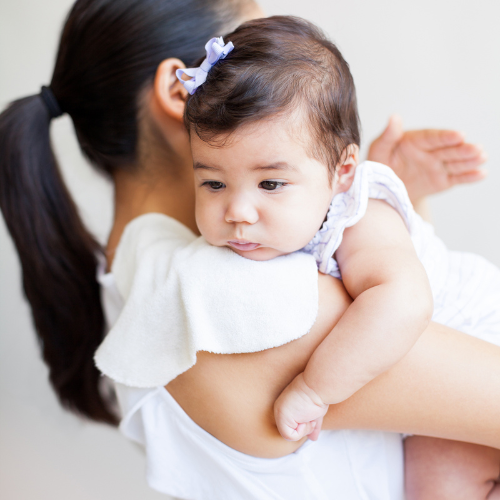Some youngsters are gassier than others, but most babies must be burped at some point, and newborns must be burped more frequently than adults and older children. They consume a lot of liquid, implying they can swallow a large amount of air.
Burping a baby might be required at any time of the day or night. Babies may fall asleep while eating, and you may need to find a technique to burp them while still sleeping. It’s incredible how much rest a newborn can get.
Even if your child falls asleep, try burping them for a few seconds before placing them down to rest. Or else, they may awaken suffering from entrapped gas.
Some babies do not burp, regardless of whether it is on their own or with your assistance. If your babies need to be burped, keep reading for methods to do so even though they’re sleeping.


Some youngsters are gassier than others, but most babies must be burped at some point, and newborns must be burped more frequently than adults and older children. They consume a lot of liquid, implying they can swallow a large amount of air.
Burping a baby might be required
at any time of the day or night. Babies may fall asleep while eating, and you may need to find a technique to burp them while still sleeping. It’s incredible how much rest a newborn can get.
Even if your child falls asleep, try burping them for a few seconds before placing them down to rest. Or else, they may awaken suffering from entrapped gas.
Some babies do not burp, regardless of whether it is on their own or with your assistance. If your babies need to be burped, keep reading for methods to do so even though they’re sleeping.
Table of Contents
How to Burp an Infant
Here are some helpful tips for burping your baby successfully:
➢ About midway with feeding, position your infant on your shoulder, face-down on your lap, or sitting up (much more below).
➢ Always have a burp towel or bib on hand to protect your clothes from stains and drool.
➢ In this position, hold her upright and give her a slight tap or massage on the left side of her back, where your baby’s stomach would be.
For most babies, a gentle pat or massage on the region, as mentioned earlier, might be enough to get their burps up.
Why Do You Need to Burp Your Baby?
Gas bubbles in your youngster’s tummy might quickly make them feel whole and irritated, which will most certainly cause them to wriggle or cry.
Food Digestion
Gas may be produced by a bacterial disorder in the large intestine when certain meals are consumed. This includes food that both the mother and child consume and alcohol given down through her breast milk.
Allergic Reaction or Food Intolerance
If your baby is breastfeeding and has an allergy to foods or a type of formula in your diet, their body may react by producing more gas. Dairy intolerance is one of the most typical offenders in this case.
Your Diet Plan
If you’re breastfeeding, your baby’s discomfort might be caused by something in your diet.
Carbohydrates are linked to the development of flatulence, according to the National Institutes of Health (milk, cheese, ice cream), beans, particular veggies (broccoli, cauliflower, cabbage), sugar-free sweets and gum, soft drink, and fruit drinks are other foods that can cause gas.
Changing your food regimen might help, but it can be challenging to figure out which meal or beverage is causing the problem since some meals take weeks to pass through your body. Also, foods that cause gas in one person may not do so in another.
Enabling Excessive Air to Enter Your Child’s Formula
When you add water to the formula, it immediately expands and aerates the liquid. After that, gas may build up in the bottle. Instead, use pre-mixed formula or let the bottle settle before giving it to your child.
Nipple Flow
The type of circulation available for a particular nipple area is usually stated by age (preemie, newborn, 3-6 months, 6+ months, and so on).
If you’re feeding your baby using a nipple area that has not been developed for him, the milk or formula may be flying out too fast, causing your kid to gulp and sputter while swallowing a lot of air at the same time.
At the same time, if you use a nipple that is too sluggish for your baby, they may suck too hard to extract the milk as soon as possible, swallowing a lot of air. Choose an age-appropriate nipple to attempt to limit the amount of air ingested during feedings.
Best Positions to Burp
Over the Shoulder
Hold your baby upright with their head directly over your shoulder. While carefully patting them on the back with your other hand, assist your child’s head and back.
Sitting on Your Lap
With one hand, support your baby’s chest and head while holding their chin in the palm of your hand and resting the

heel of your hand on their upper body (caution: do not grasp your baby’s throat; get her chin). Using the other hand, softly pat your baby’s back.
Face-down on Your Lap
Ensure your baby’s head is supported and that it is more than their chest, then carefully pat or massage your infant’s back.
If your baby does not burp after a few minutes, change the setting and try burping them again for five more minutes before feeding. Always burp your infant when feeding time is finished, then keep them upright for at least 10-15 minutes to prevent regurgitation.
When to Burp a Baby
When Should You Burp a Breastfed Infant?
Before changing over breasts, burp the baby first.
If the youngster is teething, they may also need to burp if they begin pulling away from the breast, become tight, or have trouble feeding. Burp the kid after she’s done nursing.
When Should You Burp a Bottle-fed Infant?
Burp the baby if they consume 2 to 3 ounces or become picky and stop eating.
Burp the infant after they ultimately drink their bottle
What Should I Do If My Baby Does Not Burp?
The youngster may or may not burp during and/or following a feeding. This might occur if the kid did not take in enough air.
Occasionally, however, it takes some perseverance to get a burp out. Here are some suggestions for parents and caregivers in such situations:
➢ While feeding, burp the infant. A youngster might be pretty sluggish and have ingested a lot more air when they’ve completed feeding. Try to burp them before changing breasts or halfway through their bottle if they’re being stubborn.
➢ If the infant does not burp after 5 minutes of attempting, carefully lay them down on their back in their baby crib or on a second secure surface area, such as a playpen. After a few minutes, pick up the infant and try to burp them again. In some circumstances, relaxing aids assist in moving the air bubbles about and make them simpler to release.
➢ After their feed, keep the kid upright. Using a baby wrap or sling might be an excellent method to allow the infant to sleep in a semi-upright position while allowing the air bubble to escape without any work from the mother or caregiver.
If the baby does not burp, there is no reason to be concerned. Occasionally, a kid will not burp or has no air to release. Don’t be discouraged if your child does not burp despite utilizing the procedures above. According to one research, burping doesn’t significantly reduce colic episodes.
Is It Really Necessary to Burp My Baby?
One of the numerous responsibilities parents must complete is burping until their kid becomes more self-sufficient. Children and adults can readily release gas independently, but many youngsters require assistance since they have little control over how their bodies are positioned.
You’ll discover it quickly if you have a baby who can eat without burping. If your kid has a lot of gas or spits up, talk to your doctor about reflux.
If you have a colicky youngster but can’t seem to get them to burp, concentrate on any sort of convenience gauges that work, and do not worry about getting burps out. According to one study, burping does little to help with colic.
If your baby burps a lot during the day, it’s worth it to burp them after each nighttime feeding. Because you’re already up caring for the infant, use this opportunity to give a decent effort at burping. This may help everyone get some rest after eating.
Gripe water, like any other drink, will help with the discomfort and can be found at your local pharmacy. Gripe water and gas are readily available at drug stores, yet talk to your doctor before using any of them. These supplements aren’t verified for safety and may include hazardous chemicals.
If your baby is fussy and bubbly, whether or not they spit up frequently, seek help from a physician. After a few months, most babies outgrow it.
The risk of choking on spit-up is exceedingly rare. It’s still important not to overfeed your baby, and if they seem to enjoy it, burp them after every feed.
So … When Can I Stop Burping My Infant?
The answer is … well, it depends!
The general rule is that your baby should be able to stop burping (or burp naturally on their own) at the age of four months.
Hand burping your kid is ultimately up to you, as well as it is influenced by several factors, including:
➢ If your baby is nursed, you may be able to stop burping sooner.
➢ If your baby is bottle-fed, you may need to burp them longer.
➢ You may generally stop burping soon if your kid is a content eater with little fussiness after.
➢ If your child is fast to get picky with gas pains, you may need to burp for a more extended period.
➢ If your baby has superb motor control and stays up, you can stop burping earlier.
➢ You may need to burp your kid longer if they are less mobile.
The most effective thing to do, if you believe you’re ready, is to attempt a few brief feedings without burping your kid and watch his reactions.
This certainly won’t be a cause of concern for you or your kid, other than some minor gas discomfort. If your baby is fussy, burp him, and note that you may not want to go burpless.
More Tips to Keep in Mind
If burping doesn’t help your baby feel better, consider various alternative settings and techniques to help the gas flow. “Moms and dads can assist by giving their child a massage or pushing his legs back and forth when he lies on his back—biking,” says Dr. Landau. “Allowing the infant to sleep on her tummy while awake might be beneficial, too.”
You may also research the cause of the extra gas. Something in your diet, for example, might be causing your child discomfort if you’re breastfeeding. “Among the most typical causes of gassiness is dairy—milk, cheese, gelato,” says New York City lactation specialist Leigh Anne O’Connor.
Other alternatives include allowing the bottle to clean up before feeding your infant (trembling contains a lot of air in the formula) and selecting an age-appropriate nipple. Finally, you may switch to a bottle design designed to reduce the amount of air in the bottle. If nothing seems to help with gas discomfort, parents can try non-prescription medicines (with a doctor’s approval).
Remember that burps and spit-up are natural occurrences, but projectile vomiting is not. If your child is vomiting copious amounts of material after feedings, consult your doctor to look for other causes. Typically, gassiness should not produce any additional symptoms.
If your baby’s temperature is above 100.4 degrees Fahrenheit, has bloody feces, or is excessively fussy that they can’t be soothed down, the burping may point to another issue.
Final Thoughts Burping a Baby
So, when can you stop burping your baby? The answer, unfortunately, isn’t always straightforward. It depends on a variety of factors whether your baby is bottle-fed or nursed, how content they are after eating, and their level of mobility.
If all else fails, try going without burping them for a few brief feedings to see if it makes a difference. And, as always, if you’re concerned about anything, be sure to consult with a physician.

